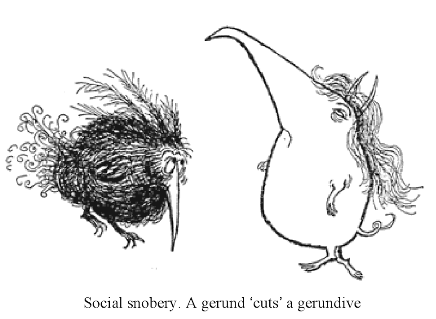Gerundive: Difference between revisions
Jump to navigation
Jump to search
Amwelladmin (talk | contribs) No edit summary |
Amwelladmin (talk | contribs) No edit summary |
||
| Line 1: | Line 1: | ||
A [[gerundive]] is a form of a {{tag|Latin}} {{tag|verb}}, having the (declinable) ending ''-ndus'' which functions as an {{tag|adjective}} meaning ''“that should or must be done”''. | {{pe}}A [[gerundive]] is a form of a {{tag|Latin}} {{tag|verb}}, having the (declinable) ending ''-ndus'' which functions as an {{tag|adjective}} meaning ''“that should or must be done”''. | ||
''There is no [[gerundive]] in English; the closest you get is a [[passive]] [[infinitive]] like “books to be read”, combining a transitive verb and its object with a sense of obligation. But wouldn’t you just use the [[active]] infinitive and avoid that ugly passive: "books to read".'' | ''There is no [[gerundive]] in English; the closest you get is a [[passive]] [[infinitive]] like “books to be read”, combining a [[transitive verb]] and its object with a sense of obligation. But wouldn’t you just use the [[active]] infinitive and avoid that ugly passive: "books to read".'' | ||
===Latin examples === | ==={{t|Latin}} examples === | ||
*[[quod erat demonstrandum]] — ''because that is the very thing one seeks to prove''; | *[[quod erat demonstrandum]] — ''because that is the very thing one seeks to prove''; | ||
*[[mutatis mutandis]] — ''changed in ways that must be changed''. | *[[mutatis mutandis]] — ''changed in ways that must be changed''. | ||
Revision as of 12:40, 1 November 2019
|
Towards more picturesque speech™
|
A gerundive is a form of a Latin verb, having the (declinable) ending -ndus which functions as an adjective meaning “that should or must be done”.
There is no gerundive in English; the closest you get is a passive infinitive like “books to be read”, combining a transitive verb and its object with a sense of obligation. But wouldn’t you just use the active infinitive and avoid that ugly passive: "books to read".
Latin examples
- quod erat demonstrandum — because that is the very thing one seeks to prove;
- mutatis mutandis — changed in ways that must be changed.
See also gerund, which is capable of social snobbery.
